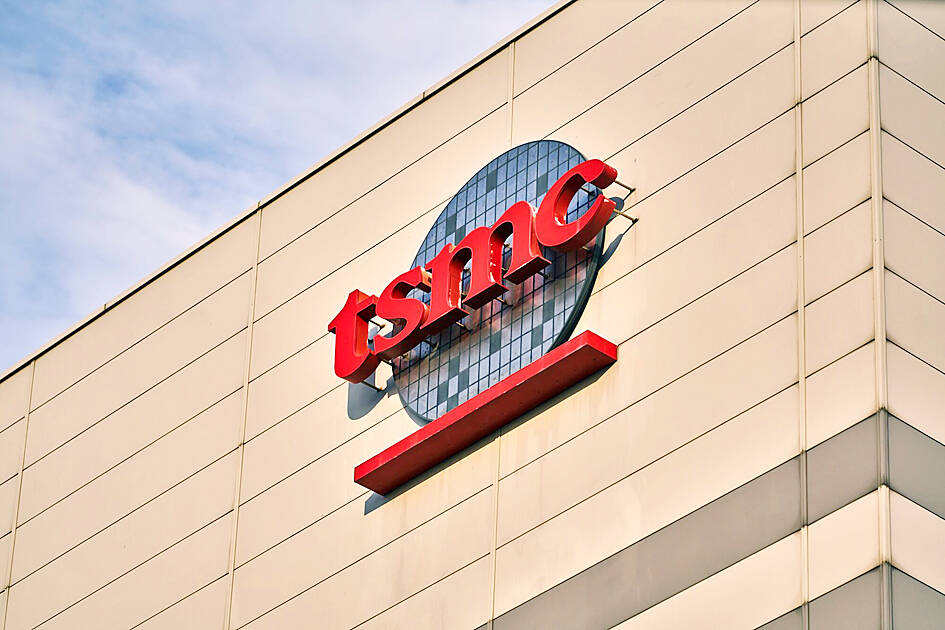An investor conference scheduled by chipmaker Taiwan Semiconductor Manufacturing Co (TSMC, 台積電) for Thursday would be watched closely for more clues about the outlook of the global semiconductor market, analysts said.
What TSMC says at the conference is expected to influence the movements of global tech stocks, analysts added.
Arisa Liu (劉佩真), a researcher at the Taiwan Industry Economics Database of the Taiwan Institute of Economic Research (TIER, 台灣經濟研究院), said she expects TSMC’s sales momentum to continue into the fourth quarter following an increase in orders from Apple Inc, which unveiled the newest iPhone 16 models using TSMC’s advanced chips, as well as from artificial intelligence (AI) chip designer Nvidia Corp and smartphone chip designers MediaTek Inc (聯發科) and Qualcomm Inc.

Photo:An Rong Xu/Bloomberg
The biggest focus of the upcoming conference would be on whether TSMC upgrades its sales forecast for this year, providing a better understanding of the demand for high-end process technologies, Liu said.
The chipmaker has forecast its sales this year would grow 24 percent to 26 percent from a year earlier in US dollar terms, topping the expected 10 percent growth in sales for the global semiconductor industry, excluding the memory chip segment.
TSMC posted NT$759.69 billion (US$23.1 billion) in consolidated sales in the July-to-September period, up 12.8 percent from a quarter earlier and up almost 39 percent from a year earlier.
The figure beat TSMC’s earlier estimate of NT$728 billion to NT$754 billion.
In the first nine months of the year, TSMC’s consolidated sales rose 31.9 percent from a year earlier to NT$2.03 trillion.
Investors are also expected to keep a close eye on TSMC’s global expansion and want to hear how the company has secured orders at its overseas bases from clients there, Liu said.
TSMC’s first fab in Kumamoto, Japan, is scheduled to start commercial production in the fourth quarter, and its first plant in Arizona would begin mass production in the first half of next year.
Last week, international news media reported that US chip designer Advanced Micro Devices Inc is set to become the second client of TSMC’s Arizona facility after Apple Inc.
In Taiwan, TSMC is developing the sophisticated 2-nanometer process technology, which is expected to start mass production next year, with investors looking for comments about the progress of this development, Liu said.
TSMC is also developing the A16 process technology, an upgraded version of the 2-nanometer technology. Those efforts are also expected to be a focus of Thursday’s conference. Mass production of the A16 technology is scheduled for the second half of 2026, Liu added.
Analysts said investors would also pay close attention to TSMC’s planned capital expenditures for next year, as the chipmaker’s spending plans would reflect market demand. In July, TSMC said its capital spending for this year is expected to be between US$30 billion and US$32 billion, up from an estimate of US$28 billion to US$32 billion made in April.
With demand for AI applications robust, TSMC’s advanced 3D chip-on-wafer-on-substrate (CoWoS) integrated circuit packaging services have been in high demand. How the chipmaker’s CoWoS expansion plan proceeds is also expected to be spotlighted at the conference, analysts said.

South Korea’s equity benchmark yesterday crossed a new milestone just a month after surpassing the once-unthinkable 5,000 mark as surging global memory demand powers the country’s biggest chipmakers. The KOSPI advanced as much as 2.6 percent to a record 6,123, with Samsung Electronics Co and SK Hynix Inc each gaining more than 2 percent. With the benchmark now up 45 percent this year, South Korea’s stock market capitalization has also moved past France’s, following last month’s overtaking of Germany’s. Long overlooked by foreign funds, despite being undervalued, South Korean stocks have now emerged as clear winners in the global market. The so-called “artificial intelligence

‘SEISMIC SHIFT’: The researcher forecast there would be about 1.1 billion mobile shipments this year, down from 1.26 billion the prior year and erasing years of gains The global smartphone market is expected to contract 12.9 percent this year due to the unprecedented memorychip shortage, marking “a crisis like no other,” researcher International Data Corp (IDC) said. The new forecast, a dramatic revision down from earlier estimates, gives the latest accounting of the ongoing memory crunch that is affecting every corner of the electronics industry. The demand for advanced memory to power artificial intelligence (AI) tasks has drained global supply until well into next year and jeopardizes the business model of many smartphone makers. IDC forecast about 1.1 billion mobile shipments this year, down from 1.26 billion the prior

People stand in a Pokemon store in Tokyo on Thursday. One of the world highest-grossing franchises is celebrated its 30th anniversary yesterday.

NEW IDENTITY: Known for its software, India has expanded into hardware, with its semiconductor industry growing from US$38bn in 2023 to US$45bn to US$50bn India on Saturday inaugurated its first semiconductor assembly and test facility, a milestone in the government’s push to reduce dependence on foreign chipmakers and stake a claim in a sector dominated by China. Indian Prime Minister Narendra Modi opened US firm Micron Technology Inc’s semiconductor assembly, test and packaging unit in his home state of Gujarat, hailing the “dawn of a new era” for India’s technology ambitions. “When young Indians look back in the future, they will see this decade as the turning point in our tech future,” Modi told the event, which was broadcast on his YouTube channel. The plant would convert